雅思口语知识点讲义
- 格式:docx
- 大小:131.74 KB
- 文档页数:99
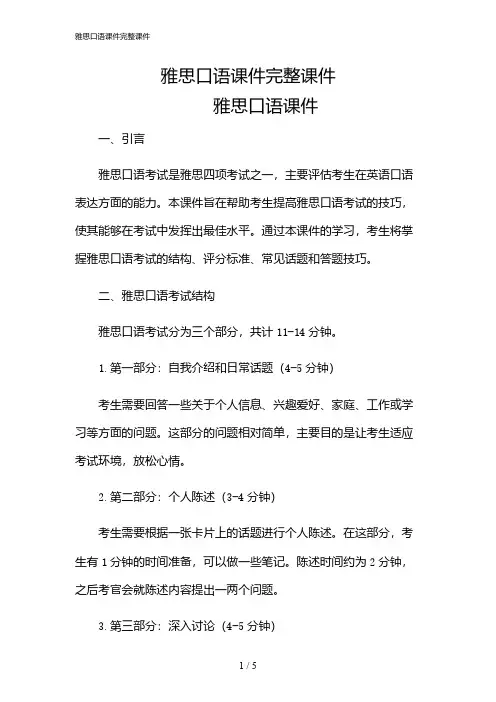
雅思口语课件完整课件雅思口语课件一、引言雅思口语考试是雅思四项考试之一,主要评估考生在英语口语表达方面的能力。
本课件旨在帮助考生提高雅思口语考试的技巧,使其能够在考试中发挥出最佳水平。
通过本课件的学习,考生将掌握雅思口语考试的结构、评分标准、常见话题和答题技巧。
二、雅思口语考试结构雅思口语考试分为三个部分,共计11-14分钟。
1.第一部分:自我介绍和日常话题(4-5分钟)考生需要回答一些关于个人信息、兴趣爱好、家庭、工作或学习等方面的问题。
这部分的问题相对简单,主要目的是让考生适应考试环境,放松心情。
2.第二部分:个人陈述(3-4分钟)考生需要根据一张卡片上的话题进行个人陈述。
在这部分,考生有1分钟的时间准备,可以做一些笔记。
陈述时间约为2分钟,之后考官会就陈述内容提出一两个问题。
3.第三部分:深入讨论(4-5分钟)考官会就第二部分的话题进行更深入的讨论,提问一些与话题相关的问题。
这部分的问题较为抽象,需要考生具备一定的思维能力和语言组织能力。
三、雅思口语评分标准1.流利性与连贯性:考生能否顺畅地表达自己的观点,是否能够使用恰当的连接词使句子连贯。
2.词汇资源:考生能否使用丰富的词汇表达自己的观点,是否能够使用一些不常见的词汇。
3.语法范围与准确性:考生能否使用多种语法结构,是否能够正确地使用语法。
4.发音:考生的发音是否清晰,是否能够使用自然的语调。
四、雅思口语常见话题1.个人信息:姓名、年龄、家乡、工作或学习等。
2.兴趣爱好:运动、音乐、电影、旅行等。
3.家庭与朋友:家庭成员、朋友关系、节假日活动等。
4.工作与学习:工作职责、学习经历、学校设施等。
5.日常生活:生活习惯、交通方式、购物等。
6.旅游:旅行经历、理想中的旅行目的地、旅行中的困难等。
7.未来规划:职业规划、留学计划等。
五、雅思口语答题技巧1.第一部分:简短回答,保持流利。
尽量避免长时间的停顿和重复。
2.第二部分:条理清晰,观点明确。
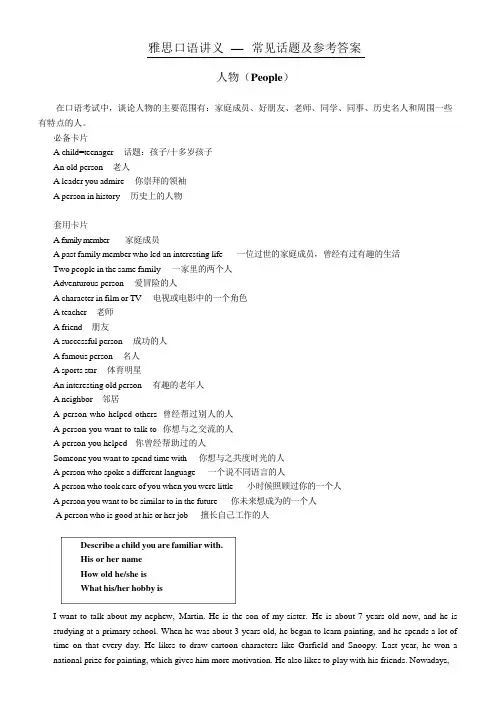
雅思口语讲义—常见话题及参考答案人物(People)在口语考试中,谈论人物的主要范围有:家庭成员、好朋友、老师、同学、同事、历史名人和周围一些有特点的人。
必备卡片A child=teenager 话题:孩子/十多岁孩子An old person 老人A leader you admire 你崇拜的领袖A person in history 历史上的人物套用卡片A family member 家庭成员A past family member who led an interesting life 一位过世的家庭成员,曾经有过有趣的生活Two people in the same family 一家里的两个人Adventurous person 爱冒险的人A character in film or TV 电视或电影中的一个角色A teacher 老师A friend 朋友A successful person 成功的人A famous person 名人A sports star 体育明星An interesting old person 有趣的老年人A neighbor 邻居A person who helped others 曾经帮过别人的人A person you want to talk to 你想与之交流的人A person you helped 你曾经帮助过的人Someone you want to spend time with 你想与之共度时光的人A person who spoke a different language 一个说不同语言的人A person who took care of you when you were little 小时候照顾过你的一个人A person you want to be similar to in the future 你未来想成为的一个人A person who is good at his or her job 擅长自己工作的人Describe a child you are familiar with.His or her nameHow old he/she isWhat his/her hobby isI want to talk about my nephew, Martin. He is the son of my sister. He is about 7 years old now, and he isstudying at a primary school. When he was about 3 years old, he began to learn painting, and he spends a lot of time on that every day. He likes to draw cartoon characters like Garfield and Snoopy. Last year, he won a national prize for painting, which gives him more motivation. He also likes to play with his friends. Nowadays,there are a lot of children who are lonely. My sister wants him to have more opportunities to enjoy his childhood. On weekends, my nephew is encouraged to invite his classmates or neighbors to come. They enjoy the gamesthat they like. They play board games, chess or monopoly. It‟s really terrific to see so many children hanging around. Besides, my nephew is also polite. He knows that he should offer his seats to the elders on the bus, and he will not have snacks until those who are older have taken their share. I guess that‟s why he is popular.Part threeInterviewer: Who are luckier, children in the past or at present?Candidate: In the past, children didn‟t have a lot of toys or snacks, but they didn‟t have a lot of pressure in their study. Nowadays, children have rich material life, but they don‟t have the fun children had before. Interviewer: What‟s the pressure brought to children by their schools and parents?Candidate: Chinese children are the only child of their family, and parents have great expectations on them. Interviewer: What do you think of primary school education in China?Candidate: Children are not taught to be creative. Instead, they are modeled in the same way. If children have different ideas from teachers, those ideas will be criticized. To be frank, I guess the primary school education is a failure.Interviewer: What did you like when you were a child?Candidate: I liked to play games and enjoyed going to the mountains on weekends with my parents. Interviewer: How can parents educate their children?Candidate: Parents should try to spend some time communicating with their children and know about what the children are thinking about. Besides, parents should always set examples for children.Interviewer: What‟s the difference between Chinese children and western children?Candidate: Chinese children are more obedient, and they like to follow the instructions of their elderly. On the other hand, western children are better at their creativity and imagination.Interviewer: What‟s the difference between western parents and Chinese parents?Candidate: Western parents tend to treat their children like friends, and they try to reason with their children. Children feel respected. Chinese parents always want to be authoritative in front of their children. Interviewer: Do you think that young people should have more freedom?Candidate: Yes. Young people in China are controlled by their parents, and they should be free to make decisions for themselves.Interviewer: Do you think that parents care too much about children‟s education?Candidate: Chinese parents want their children to be the best among the peers and they spend much money sending children to learn different skills like dancing, singing or painting. I think they care too much about children‟s education.Adventurous person从事冒险活动的人这个人不一定是身边的人,也有可能是影视中的角色,也有可能是名人或者历史人物。
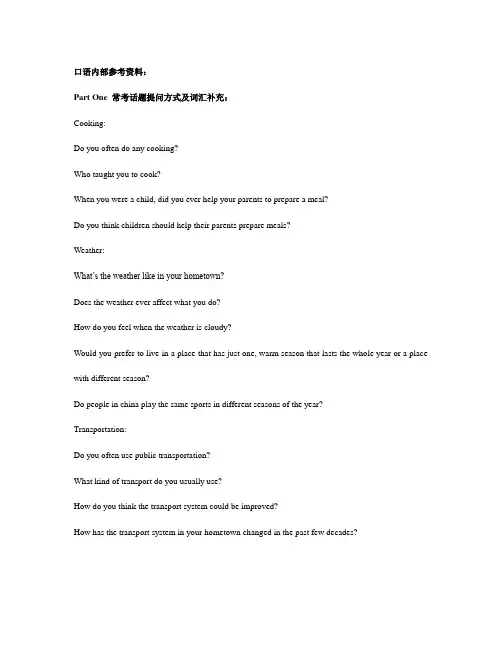
口语内部参考资料:Part One 常考话题提问方式及词汇补充:Cooking:Do you often do any cooking?Who taught you to cook?When you were a child, did you ever help your parents to prepare a meal?Do you think children should help their parents prepare meals?Weather:What‟s the weather like in your hometown?Does the weather ever affect what you do?How do you feel when the weather is cloudy?Would you prefer to live in a place that has just one, warm season that lasts the whole year or a place with different season?Do people in china play the same sports in different seasons of the year?Transportation:Do you often use public transportation?What kind of transport do you usually use?How do you think the transport system could be improved?How has the transport system in your hometown changed in the past few decades?Cooking:All you can eat 自助餐Tasty 好吃的Gourmet 美食Food court 美食街Snack 小吃Pasty 肉馅饼Take out or delivery 带走or外卖Combo with 3 items 3菜套餐Chef主厨Greasy and fattening 油腻发胖的Nutritious and organic 营养有机的Juicy 新鲜的Dessert 小吃Refreshment 茶点Fruit salad 水果沙拉Junk food 垃圾食品Sashimi 刺身Sushi 寿司Teriyaki 照烧Hot sauce 辣椒酱Ketchup 番茄酱Weather:Revitalizing 复苏的Cozy 舒适的Comfy 舒适的Stuffy 闷热的Scorching 闷热的Moist 潮湿的Humid 潮湿的Freezing 寒冷的Chilly 寒冷的Muggy 闷热的Pleasant/delightful/desirable愉悦的Gloomy 阴郁的Showers 阵雨Snow flake 雪花Raindrop 雨点Heavy rain 大雨Breeze 微风Strong breeze 强风Hurricane 飓风Tornado 龙卷风Earthquake 地震TransportationCar emission 汽车尾气Smoggy air 雾霾Carbon dioxide 二氧化碳Cab 黄包出租车Buggy 高尔夫球小车Skytrain 轻轨Bumper-to-bumper 拥堵的adj Highway 高速公路Block 街口Traffic congestion 交通拥堵Get stuck in 堵车Traffic lights 交通灯Subway 地铁Sports car 交通Densely-populated 人口闭幕很大Pedestrian 步行者Leisure&RelaxWhat do you do to relax?Do vacations help you relax?What do you usually do at weekends?favorite (adj/n) 最爱(的)surf on the internet 上网cup of tea 最喜爱的release pressure 释放压力take my minds off... 把思想从...上移开almost everyday 几乎每天be crazy about...对...疯狂relieve myself 放松自己be sure that... 对..确信play an important role in...在...中扮演重要角色during(prep)在...之间spend...on.../(in)doing... 花...(时间,金钱等)在...上cozy(adj) 舒适的,温馨的escape from...temporarily 暂时逃离...scenery spots 景点breathe fresh air 呼吸新鲜空气get close to nature 贴近自然get refreshed 焕然一新sleep in/lie in 睡懒觉kill time/pass the time 打发时间soothing music 轻音乐do some reading 读东西magazines(n) 杂志atmosphere(n) 氛围be immersed in... 沉浸在...中stay away from work crush 远离工作压力catch some rays 晒太阳home cooking 家庭料理Music&FilmWhat‟s your favorite kind of music?Do you play any instruments?What do you usually watch on television?Do you think the TV shows today are different from the TV shows you watched as a child?like...best 最爱... a variety of 各种各样的pop music流行音乐rock&roll 摇滚乐classic music 古典音乐R&B 节奏布鲁斯音乐lyrics (n) 歌词calm down 静下来melody (n) 旋律release emotion 释放情感play the guitar 弹吉他piano(n) 钢琴violin (n) 小提琴drums (n) 鼓pluck the strings 拨弦...let me feel... 让我觉得...my dream was to be... 我曾经梦想成为... cultivate a hobby 培养爱好...sounds soft and graceful 听起来柔和优雅think of... 想起...preference (n) 喜好news (n) 新闻variety shows 综艺节目talent shows 才艺节目reality shows 真人秀TV series 电视剧系列channel (n) 频道bring me laughter 带给我欢笑a big fan of... ...的狂热粉丝never miss an episode 绝不错过一集differ from... 与...不同content (n) 内容diversity of TV programs 节目多样性dull/boring (adj)单一的dramatically (adv) 极大地... be enriched 丰富...in my memory,... 在我的记忆中recollect... (v)回忆compared with... 与...相比而言...have/has changed a lot 改变了很多Sports&Outdoor activitiesAre there any differences between the sports played by boys and the sports played by girls? Does playing outdoor sports help you relax?What are the most popular sports in China?exciting(adj)令人激动的highly competitive 高竞争性的aim (n) 目标require (v) 需求strength (n)力量muscles (n) 肌肉lose weight 减肥keep fit 保持健康keep...in shape 保持体形jog (v) 慢跑do yoga 做瑜伽car racing 赛车sedentary (adj) 久坐的enjoy the sunshine 晒太阳activate one‟s blood 加速血液流动let off steam 释放压力reduce the burden from work 减少工作压力aerobic (adj) 有氧的take a deep breath 深呼吸physically healthy 在身体方面健康的obviously (adv) 明显地football (n) 足球table tennis (n) 乒乓球excellent (adj)优秀的player (n) 运动员champion (n) 冠军attractive (adj) 有吸引力的famous (adj) 出名的worldwide (adj) 世界范围内的community (n) 社区campus (n)(大学)校园be keen on... 对...感兴趣Part 1 必备句型(1)定语从句我经常看的电视节目超级搞笑。
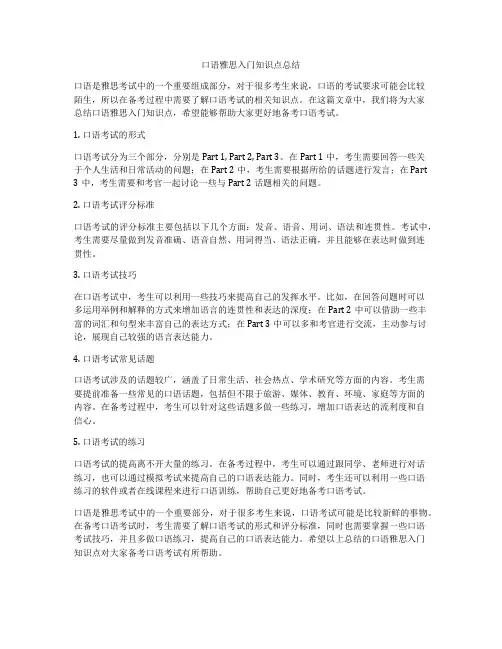
口语雅思入门知识点总结口语是雅思考试中的一个重要组成部分,对于很多考生来说,口语的考试要求可能会比较陌生,所以在备考过程中需要了解口语考试的相关知识点。
在这篇文章中,我们将为大家总结口语雅思入门知识点,希望能够帮助大家更好地备考口语考试。
1. 口语考试的形式口语考试分为三个部分,分别是Part 1, Part 2, Part 3。
在Part 1中,考生需要回答一些关于个人生活和日常活动的问题;在Part 2中,考生需要根据所给的话题进行发言;在Part 3中,考生需要和考官一起讨论一些与Part 2话题相关的问题。
2. 口语考试评分标准口语考试的评分标准主要包括以下几个方面:发音、语音、用词、语法和连贯性。
考试中,考生需要尽量做到发音准确、语音自然、用词得当、语法正确,并且能够在表达时做到连贯性。
3. 口语考试技巧在口语考试中,考生可以利用一些技巧来提高自己的发挥水平。
比如,在回答问题时可以多运用举例和解释的方式来增加语言的连贯性和表达的深度;在Part 2中可以借助一些丰富的词汇和句型来丰富自己的表达方式;在Part 3中可以多和考官进行交流,主动参与讨论,展现自己较强的语言表达能力。
4. 口语考试常见话题口语考试涉及的话题较广,涵盖了日常生活、社会热点、学术研究等方面的内容。
考生需要提前准备一些常见的口语话题,包括但不限于旅游、媒体、教育、环境、家庭等方面的内容。
在备考过程中,考生可以针对这些话题多做一些练习,增加口语表达的流利度和自信心。
5. 口语考试的练习口语考试的提高离不开大量的练习。
在备考过程中,考生可以通过跟同学、老师进行对话练习,也可以通过模拟考试来提高自己的口语表达能力。
同时,考生还可以利用一些口语练习的软件或者在线课程来进行口语训练,帮助自己更好地备考口语考试。
口语是雅思考试中的一个重要部分,对于很多考生来说,口语考试可能是比较新鲜的事物。
在备考口语考试时,考生需要了解口语考试的形式和评分标准,同时也需要掌握一些口语考试技巧,并且多做口语练习,提高自己的口语表达能力。
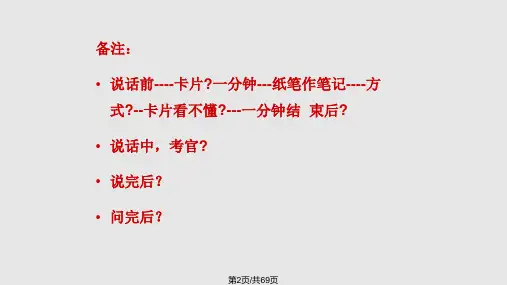
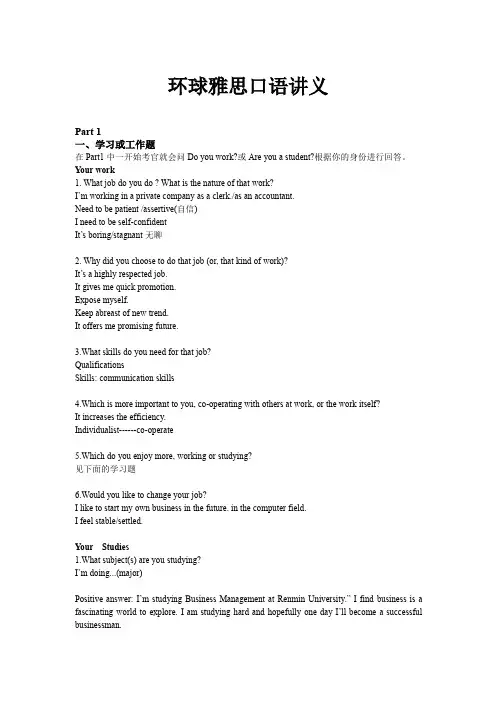
环球雅思口语讲义Part1一、学习或工作题在Part1中一开始考官就会问Do you work?或Are you a student?根据你的身份进行回答。
Your work1.What job do you do?What is the nature of that work?I’m working in a private company as a clerk./as an accountant.Need to be patient/assertive(自信)I need to be self-confidentIt’s boring/stagnant无聊2.Why did you choose to do that job(or,that kind of work)?It’s a highly respected job.It gives me quick promotion.Expose myself.Keep abreast of new trend.It offers me promising future.3.What skills do you need for that job?QualificationsSkills:communication skills4.Which is more important to you,co-operating with others at work,or the work itself?It increases the efficiency.Individualist------co-operate5.Which do you enjoy more,working or studying?见下面的学习题6.Would you like to change your job?I like to start my own business in the future.in the computer field.I feel stable/settled.Your Studies1.What subject(s)are you studying?I’m doing...(major)Positive answer:I’m studying Business Management at Renmin University.”I find business is a fascinating world to explore.I am studying hard and hopefully one day I’ll become a successful businessman.Negative answer:I’m doing laws at Renmin University.It’s…(非常无聊,不是自己选的,对它没什么兴趣…)Neutral answer:我在北京大学读艺术专业。
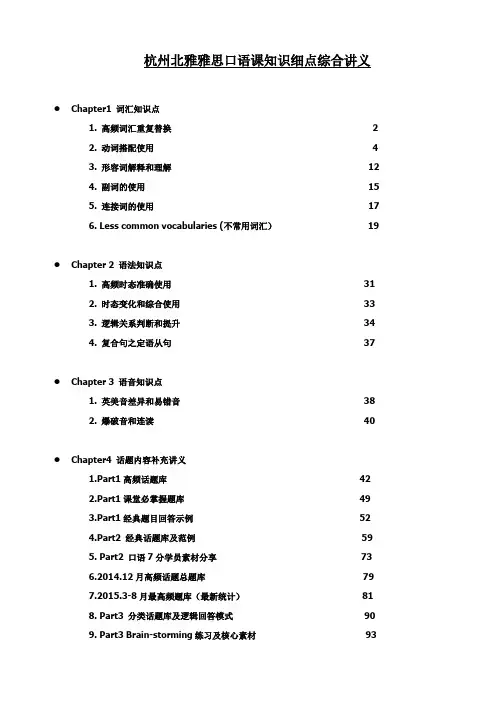
Grammatical Range Test PracticeA. Collocation Issue PracticeExample 1: My mom help me to walk out the most grieved period in my life until now.Example 2: We need to collect the data and write a paper around the results.Example3: She delay the progress of the team, so we can not finish the work before the deadline.Example4: She were pretended friendly and ask my recent study situation though she knew I am not goodat studyB. Sentence Structure Enhancement PracticeExample1 :But frankly speaking, I don’t really like making intimate friends with her. She is self-centered and unreliable.What she thinks about is all herself, not caring about others’ feelings. Additionally, she often breaks promises and lets people down.Example2:She is one of my friends. We knew each other in the first year since we were classmates. She is pretty academically developed. She always comes as the top in the subject though she doesn’t seem study much.Example3:I usually go to the museum with my parents. After dinner we are walk to the Canal Museum, this museum is near my house and always hold many activities.Example4:My mom help me to walk out the most grieved period in my life until now. The most grieved period was the year before last when I were prepared for the college entrance exam.Example5:She were pretended friendly and ask my recent study situation she knew I am not good at study,so every time when she asked it really make me feel embarrassed and want to escape.Example6:Q: Do you think listening to the music is important?A: Definitely, it is crucial for everybody to listen to the music.One the one hand, it is enjoyable, which will help people to releasepressure.On the other hand it is effective way for people to bemore creative.More useful collocation:grab a cup of coffeesubscribe the online-resourceslog onto the websiteappreciate the artworkdraw up a proposal/outline/a conclusiondevelop confidence/ a good habit/physical and mental healthfall out with peoplegrow apart with peopletalk sth throughspoil one dayadd up to the atmospheredistort the truthcut down the storyarouse/Kindle one’s interest/curiosity in promote efficiency/equalityfulfill one’s dream/responsibilityshift focus from xxx to xxxdedicate many hours to sthflesh out the initial ideaskeep the project on the trackpore over every draftstay on the pointsdeliver advice with speedkick the whole thing offowe much to sbbe indebted toplace importance on sthcut to the heart of the matterbe labeled by genderturn out to be a master of structure walk ab step by step through sth reach out to sb for sth3) _______________________________________________________________例如:一个人的创业史(第一桶金来源),梦想的实现,恋爱婚姻观(相亲史/不婚主义),特殊的旅行经历,某人对于热门话题的独特见解等,这些都可以是有意思对话的素材,举个小例(主体部分):An unknown man I met in the train during a journey started a topic about how the kids and young people from the new generation have little passion on learning and busy doing unproductive staffs. Surely I started defensing the young generation and expressed the differences the new generation had with their ancestors. The conversation started to turn into a debate and both of us used our logic and reasoning. The conversation was interesting and I was actively participating in it mostly because he had good and polite way of conversation. He told his reasoning for this belief but when I showed him my logic,though this man was around 12 years senior to me, he never took any advantages of it and he treated me as an equally skilled opponent on this issue. Besides, he agreed that he learned many new facts about the new generation and our ways of thinking and lifestyles.Extra practice of adv. (7+)Choose the most appreciate adv of each blank.rgelyb.surelyc.clearlyd. thankfullye. persistentlyf. certainlyg. fortunatelyBullying is 1______unpleasant, and can make the child experiencing it feel unworthy and depressed. In extreme cases it can even lead to suicide, though this is 2_________ rare. Victimized/Victimised pupils are more likely to experience difficulties with interpersonal relationships as adults, while children who 3_________bully are more likely to grow up to be physically violent, and convicted of anti-social offences.‘There is no bullying at this school’ has been a common refrain, almost 4_____ untrue. 5_________ more school are now saying: ‘There is not much bulling here, but when it occurs we have a clear policy for dealing with it.With these development, schools can expect that at least the most serious kinds of bullying can 6______ be prevented.The reduction in bullying- and the consequent improvement in pupil improvement in pupil happiness-is 7_____ a worthwhile objective.B.contrast and concessionhowever despite/in spite of/regardless of whereas conversely instead while on the contrary in/by contrastthe most obvious difference is that….compared with…, …is more……is quite similar with…in terms of …Task practice:What are the differences between sending emails and writing letters as contact ways with your friends?_____________________________________________________________________________________ _____________________________________________________________________________________ _____________________________________________________________________________________ _____________________________________________________________________________________ _____________________________________________________________________________________ _____________________________________________________________________________________ ________________________T.officially order that sth. should be forbiddenU.to reduce the negative effect of sth.by doing sth. that has an opposite effect V.reduce the total amount of tax by an average personChapter 2语法知识点:7.1高频时态准确使用一般现在时,一般过去时,现在完成时,将来时(5.5-6)现在完成进行时,过去完成时,将来进行时(6-6.5)以下为部分真题示例:∙一般现在时:what’s your favorite music?Do you like the place you’re living in now?Do you work or are you a student?∙过去时:Why did you choose your major?What kinds of games did you play when you were a child?What did you do for entertainment when you were a child?What kinds of gifts did you often receive when you were muchyounger?∙现在完成时:Has your city/the countryside changed a lot in the last few years?Have you ever learned to play any musical instruments?∙将来时:Will you move to another city /house ?What might be your ideal job ?How will the mobile phones develop in the future?7.2 The mix use of tenses时态转化或综合使用范例(更高分)1.What changes have taken place in your hometown in the last 20 years?Well, I'm pretty young, but my parents always complain that my hometown'straffic is much worse, and they say that prices are a lot higher. But I think onthe positive side, life is better, houses are in better condition and there aremuch better shops and cleaner conditions in the restaurants.2.Has tourism changed China very much?Yes, very much in the last 10 years. Each year we are getting more tourists coming toChina since the open-door policy. Some big cities in China have become morecosmopolitan, attracting more foreigners in recent years.3.Has the transport changed over the past 20 years in China?Yes, a lot. We used to have very few bus lines years ago and people chose to go around the city by bike . But now in big cities there are more bus lines or new subway system, which has made commuting a lot easier and faster than before.4.How long have you been studying English?In my memories, I started learning English in junior school, so I guess you could say I have been keeping learning it for more than 9 years in total,even though it's been kind of "off and on."5.Do you like planting?Though I don’t plant now, in my memories I used to be fond of planting lovely sunflowers or taking care of potted plants. I was actually good at keeping plants healthy as a child, so I suppose that I didlove planting when I was much younger.7.3易混淆时态区分练习(过去时态和完成时)Correct errors of the following passage (Tenses and voice)I would like to be considered for your course degree in Zoology, starting in October next year. I feel I am a good candidate for this course as I have always been interested in natural history and even as a child I have enjoyed studying animals and insects in my garden. Your science faculty has a good reputation and I would very much like to be part of it. As you already saw in Section A of this application , I have a good academic record and I just received the results of my recent exams, all of which have been excellent.In addition, your university attracts me because I enjoy sports and I have read in your prospectus the large number of sports on st year I have represented my school at badminton and I played in football teams since I was eleven. I have recently joined a basketball team which competes at a national level.I did not travel abroad much yet, although as a young child I have been to Singapore and Hong Kong with my family.I realize that I did not spent much time away from home up to now,but am keen to become more independent.7.4时态与被动语态综合使用用动词的正确时态语态填空Our desks and chairs ________________ (make) of wood. The paper of books and newspapers ______ also ___________ (make) from wood. Even some kinds of cloth __________________ (make) from it. Many people ____________ (burn) wood to keep themselves warm in winter. Indeed, wood _______ (be) important in our everyday life.Where ________ wood __________ (come) from? It ________________ (take) from trees which_____________(grow) in the mountains. _________ you ____________ (know) how it ____________ (get) to us from the mountains?' Signpost ' words(6.5+) Extra Task practiceDomestic Violence is a sensitive issue in most societies and affects millions of women worldwide. ICRW ( 2004, p.4) claims that 'nearly one out every three women has experienced physical, emotional or sexual violence in an intimate relationship'. ________ there are many definitions of domestic violence, this study will define it as :'Behaviours that are used by one person in a relationship to control theother through: (1) a real or threatened physical harm, (2) emotional paininfliction or manipulation, (3) real or threatened sexual harm or (4)economic control.' ( Tichy et al, 2009, p. 549)__________ the nature and structure of the family life in country X ( i.e. Joint family, in which the husband and wife often live with the husband' family), this study will ______ take into account the violence perpetrated by the husband or intimate partner ________ by the in-laws.In country X, __________ the Protection From Domestic Violence Bill legally bans the ( physical and emotional ) harming of an intimate partner, it omits to mention the need to develop support structured to help victims and to fight this problem. _________, domestic violence is still considered as a private matter and as an ' invisible' issue because occurring within household walls.8.2复合句之定语从句Attributive Clauses- 定语从句中用which 和where 的区别Just beside the station was a stadium, which was built in the 19th century, and where games are now held every weekend.真题举例:Describe your favorite cafe or restaurantOne of my favorite cafes,Urban Cafe, _______ situates in North-East of my city, and ________ a wider selection of desserts and beverage come as the biggest attraction.Rewrite the sentences below as single sentences using clauses.将以下的简单句变成复合句(优先考虑定从)1.Some students take a year out before university.This allows them to work or travel.-----2.The lecture was about current economic policy.It was not very easy to understand.------3.In 1951 my parents arrived in New York. They stayed there for the rest of theirlives.------4.The government needs a lot more support.------the cost of beefwide of the mark 毫不相关come into the marketChapter 4 Part1高频话题库及范例Part 1具体高频话题Name:1.What’s your full name?2.Who gave you that name?3.Does your name have any particular meaning?4.Would you like to change your name?5.What names are most common in your hometown?Work or study:1. Do you work or are you a student?2. What work do you do?3. Why did you choose to do that kind of work?4. Why did you choose to study those subjects/that major?5. What’s your favorite subject ?6. What do you plan to do after you finish your studies?7.Have you experienced stress at work/study?Hometown:1.Where is your hometown/Where do you come from ?2.Do you like your hometown?3.What’s your favorite part of your hometown?4.Is there anything interesting in your hometown?5.Did your friends also grow up in the same place as you?6.Would you like to live in your hometown in the future?House and apartment:1.Do you live in a house or an apartment? /Where do you live now? And how long have you been there?2.What's your favorite room in your house/apartment?3.What do you usually do in your house/flat/room?4.Do you plan to move?5.Would you like to move to another place to live?Entertainment:1.What do you do in your spare time?2.How do you usually spend your evenings?3.What do you do for entertainment?4.Did you like drawing when you were a child?5.What did you do for entertainment when you were a child?6. Have you recently been to any place for entertainment?Music1.What’s your favorite kind/sort/type of music?2.Did you often listen to music when you were a child?3.Have you ever been to a musical performance?4. Have you ever learned to play a musical instrument?5. Is music an important subject at school in China?TV programmes1. Do you like watching TV?2. What types of TV programs do you like to watch?3. What TV programmes are popular in your country ?4. What types of TV programmes will be getting popular in the future ?5. How have TV programmes changed in the last decade ?Buildings:1. What kind of building are you living in now?2. How have buildings changed in the past years?3. How do people feel about old buildings in china?4. What kinds of buildings are popular in China now?5. Do old people and young people in China have the same attitudes towards old building?6. Is it important to preserve old buildings?Sports:1.Do you like any sports/What’s your favorite sport ?2.Did you play any sports at school?3.Is there any sport that you have never played that you would like to try?4.What are the most popular sports in your country?5.Why some people hardly do sports?Mobile phones:1.Do you have a mobile phone?2.When did you first have a mobile phone?3.Do you prefer to talk on phone or text message ?4.Have you ever had any problems using your mobile phone while traveling?5.How have mobile phones changes in the last few years?6.How do you think mobile phones will develop in the future?Writing /Emails and letters:1.Do you often write emails?2.On what occasions do you write letters?3.How did you learn to write?4.Do you prefer to write letters or emails to your friends ?5.What are the differences between sending emails and writing letters?6.Do you write sometimes?7.Do you have a plan to write a book in the future?8.Do you think handwriting is very important (nowadays)?9. How can children today improve (or, practice) their handwriting?Computers:1.What was you impression when you used a computer the first time?2.Have computers changed your life in any way?3.When did you first start using the internet?4.Do you play any computer games?5.Is the internet very important to you?6.Do you think you can live without the internet?7.Do you think information on the internet is very reliable?Public transport:1.What form of transport do you usually use?/How often do you use public transport?2.Is the transportation very crowded in your city?3.Do you sometimes travel with a boat?4.Would you like to spend a holiday on boat?5.Do people in your city often travel by boat?6.Do you think the price of public transport is low in your city?Advertisement:1.What are the various places where we see advertisements?2.Why do you think there are many advertisements now?3.What kinds of advertisement do you like the most?4.Do you like advertisements on TV?5.Do you prefer advertisements on TV or those in magazine?6.Have you ever bought anything because of an advertisement?Clothes and fashion:1.Are you interested in fashion and clothes?2.How often do you buy clothes online?3.How often do you go shopping for clothes?4.What kinds of clothes do you usually wear?Patience:1.Are you a patient person?/Are people in your city patient? 2.When do people need to be patient?3.Is it important to be patient? Why?4.Is it easy to be patient? Why?5.How can people be patient?6.What do you do when waiting for the bus or something else? Busy life:1.Have you been busy recently?2.Are people now getting busier ? And why?3.Do you want your future life to be busy or not ?4.If you have more free time, what will you do?5.How do you handle stress?Sleeping:1.How many hours do you sleep every day?2.Is it necessary to take a nap every day?3.Do old people sleep a lot? Why?4.Do you think the old need more sleeping/need to sleep longer? Walking1.Do you like walking? Where do you walk?2.Did you like walking when you were a child ?3.Will you prefer to use some form of transportation?4.What do you think are the benefits of walking?Photographs/Photographing1.Do you like taking photos/photographing ?2.What do you usually take photographs of, the views or the people? 3.Do you like cameras?4.Do you have a photo album ?5.How do you think you will you keep(save) your photos?6.Do you think it's important to preserve memories?Drawing(or painting)1.Have you ever learned to draw?2.Do you like drawing? How often do you draw something?3.What kind of pictures do you like to draw?4.Do you think it's important for children to learn to draw?5.What are the benefits of drawing for adults?News1.Are you very interested in the news?2.What sort of news are you most interested in?3.Do you ever get your news from the internet?4.Do you prefer to read news through the internet or on the newspapers?5.How important do you think the news reading is?6.Would you say the news affects your life a lot?Cooking/housework1.Do you know how to make(prepare ) a meal?2.Who usually cooks in your family?3.Have you ever thought about learning how to cook?4.How did you learn to cook?/Who taught you how to cook?/When did you learn cooking?5.Do you think everyone should learn how to cook?6.Do you often do housework?7.Which type of housework don't you like/you hardly do?8.Should children do more housework?Gifts1.Do you often give gifts to people?2.What was the last gift you received recently?3.What was the last gift you gave to someone?4.Have you ever sent someone a gift you made yourself?5.Do you think gift-giving is very important?6.Do people in China like to give gifts(to other people)?Parks1.Do you often go to parks ?2.What kinds of parks are popular in your country ?3.What are the differences between the parks in foreign countries and the ones in your country ? Trees1.Do you likes trees ? And why ?2.Did you like climbing trees where you were a child ?3.Do you think people like to go the places where there are many trees ?4.Is forest protection important ? And How to protect forest ?Concentration/study:1.What do you usually concentrate on and when ?2.Whether it is easy for you to keep your concentration on something or not?3.When is the best time you study well ?Dancing1.Do you dance? When was the last time you danced?2.Why do people like dancing?3.What do you feel when you watch dancing programs on TV?4.Is it important to learn how to dance?5.What types of dancing are most popular in your country?Relatives1.Do you have many relatives?2.When you were a child, did you visit relatives quite often? How about now ?3.Who do you feel is now the most important member of your family?Birthday1.Do you celebrate your birthday and how ?2.Do people in China celebrate birthday?3.How do Chinese people celebrate birthdays?4.Who do you like to celebrate your birthday with?5.Do all your friends know when your birthday is?6.Do children and adults celebrate birthdays the same way?Friends1.What do you often do with your friends in your leisure time?2.Is friendship important to you?3.Do you prefer to spend time with friends or spend time alone?4.What kind of people do you like to have as friends?Time Management/Plan1.How do you organize your time?2.Do you think young people and older people organize their time in the same way?3.How do you manage your time?4. Do you make plans in everyday life ?5. Why do you think some people never/hardly make plans?6. Is it important to make plans in everyday life?Bags1.What types of bags do you use?2.Do you usually carry a bag when you go out?3.What sorts of bags do women like to buy?4.Do you have different bags for special occasions?Countryside1.Do you go to the countryside?2.What kind of houses are there in the countryside? What is the usual style and why there are so many houses of this style?3.What are the differences between living in the countryside and living in the city center?4.How has the countryside changed in the last decade?Daily routine1.What time of the day do you like best? What’ the best part of the day for you? What time in a day can you work more effectively?2.When do you do most of your study?3.Would you like to change your daily routine (in any way)?4.How much time do you think people should spend working per week?Traveling1.Do you like traveling ? Where do you like to go when you go traveling?2.Have you ever traveled for a long time? = Have you (ever) been on any long trips?Do you like long trips?3.How do you feel when you travel?4.Do you prefer to travel alone or with other people?5.Where (which country or place) would you like to travel to (in the future)?Place/Museum1.What kinds of museums are popular in China?2.What can people learn from these places?3.Do you think that people should be charged when they go to museums?4.How can a museum attract people?Keep healthy/food1.Do you think you are leading a healthy lifestyle ?2.How do you understand a healthy lifestyle?3.What kind of food is healthy? What is junk food?4.How can people improve their health in China? How can school/parents help children stay healthy?5.Do you work out/exercise regularly? How about most people old and young in China?6.How can employers/government encourage people to live healthily?Part1 课堂必须掌握话题1. Are you a student or do you work ?2. Why did you choose your major?3. What might be your future major?4. What was your favorite major in senior school?5. Which subject didn’t you like in senior school?6. Did you enjoy your school life7. Do you like your city you’re living in now?8. Is there anything interesting in your city?9. Is there anything you really don’t like in your city ?10. Do you like the living place you’re living in now ?11. Do you think that your living place is a good place for children?12. Do you live in an apartment or a house ?13. What’s your favorite room ?14. Do you prefer to live in a house or an apartment?15. Do you have a plan to move to a new house or an apartment? Part 1 高频喜好类较难题。

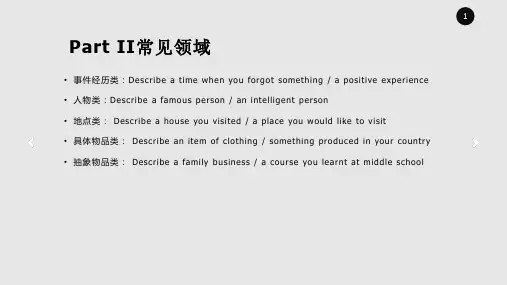


C o n v e r s a t i o n s雅思口语课程学习讲义(总24页)--本页仅作为文档封面,使用时请直接删除即可----内页可以根据需求调整合适字体及大小--Part One : Question & Answer 问答式话题讨论Hometown家乡1.Where do you come from Could you tell me something about hometown2.Where are you from / How long have you lived there3.Where do you live now What are the advantages and disadvantages of livingthere4.What places would you recommend a visitor to go to in your city / hometown5.Have recent social changes created any problems in the place you live in6.What changes have you seen in the past few years in your town7.What kind of landscape surrounds your hometown what is the climate like in yourhometown/ What is the weather like in your hometown8.What are the main places of interest in your hometownLeisure Activities/ Hobbies 休闲活动及兴趣爱好1.What do you do in your spare time2.What are your spare time interests/hobbies3.How do you spend your leisure time4.How do you spend your weekends /What do you like doing at the weekend5.Do you like reading What kind of books do you read6.What is your favorite sport What are the rules7.Do you often read newspapers Which ones do you read8.Do you often go to the cinema/ theatre9.What kind of films do you like best10.Do you often watch TV What id your favorite program11.What kind of music do you enjoy12.Who is your favorite film star Will you describe him/her to me13.How do people usually spend their free time in your countryAmbitions雄心1.Do you have any ambitions2.If you could start your life again, would you do anything different3.What do you see yourself doing in ten years’ time4.Have you ever thought to have your own business What kind of business do youhope to have5.How do you want to develop your careerFuture Plan未来规划1.What are your plans for your future2.What are your plans on your returning to Chins3.What do you intend to do after you finish studyingLiving/Studying Abroad在国外生活及学习1.Do you want to study abroad2.Which country do you intend to go to3.What are you going to study / What do you intend to study4.What are you going to major in5.Which university are you going to study at6.Have you been admitted by the university you apply for7.What is your research proposal all about8.Why do you want to study abroad9.What will be your main problem when you are studying in a foreign country10.Some Chinese students feel that overseas students get preferential treatment.What is your opinion11.What kind of culture shocks do you think will be probably encountered in westernworld How will you overcome them12.What problems can you foresee in the future when you come back to China Education教育1.Say something about your educational background. /Can you tell me a little aboutyour educational background2.What is your major / How do you like it3.What subjects did you study at university Do you think they are useful inpreparing you for your future work4.Which is the best university in your country5.Could you sum up your own study habits in a few points6.Do you think the subjects you are studying today are relevant to present-daysociety WhyCampus Life校园生活1.Can you say something about your school life2.Could you tell me something about your campus life3.What impressed you most when you were at university4.What are the best and the worst memories you have of your primary orsecondary school days5.Did you ever take part-time jobs when studying at university6.Do you think it’s a good idea for full-time students to take part-time jobs Language语言学习1.What aspect of English do you find the most difficult2.Do you think foreign language learning is important3.Do you think you will be able to cope with the English-language demands of yourintended program4.How do you think language should be learned5.How many foreign languages can you speakCity 城市生活1.How do you like Shanghai Compare it to your hometown.2.What do you think about the city you live in3.What place do you like best in Shanghai/Beijing4.What places in Shanghai/Beijing should a foreigner visit5.If you had the choice, where would you choose to live inTraveling旅行见闻1.Do you like/enjoy traveling Where have you been to2.Which country/place would you most like to visit3.Which parts of China would you recommend a foreigner to visit4.Have you ever been to another country Where did you go5.Which is the best place you’ve been to in China/ Which place do you like best6.What do you like to do when you visit an unfamiliar placeHouse and Home生活居所1.What’s the house like you live in now How do you feel about it2.Could you describe your home3.If you were given a choice, what sort of house would you like to live in why4.Could you describe the traditional architecture of your countryCooking烹饪1.Do you enjoy cooking2.Who does most of the shopping / cooking in your family3.What is the favorite food in your familyFriendship友谊1.Do you have a lot of friends2.What does friendship mean to you3.What kind of people do you make friends with4.What would you do if your next door neighbor were noisy nearly all the time Part Two : Description描述性话题讨论1.2.34.56.7.8.9.10.11.12.13.14.15.16.17.18.19.20.21.22.23.24.25.26.27.28.29.30.31.32.33.34.35.36.37.38.39.40.41.42.43.45.46.47.48.49.50.51.52.53.55.56.57.58.60.61.62.63.65.66.67.68.70.71.72.73.75.76.77.78.80.81.82.83.84.85.86.87.88.89.90.91.92.93.94.95.96.97.98.99.100.。
雅思口语考试必考知识点雅思口语考试主要考查考生的英语口语表达能力,需要良好的语音语调、语法、词汇和思路表达能力才能获得高分。
以下是雅思口语必考知识点的大全。
一、基础知识1. 词汇量和语法规则对于口语而言,词汇量和语法十分重要,因此需要加强词汇的积累及语法的规范,以及语言表达的简洁和自然性。
2. 会话技巧良好的会话技巧能够帮助你快速找到话题,有效地表达你的意思。
在雅思口语考试中,需要注意对话的流畅性和连续性。
二、口语考试题型1. 个人陈述题个人陈述题通常要求考生就一个主题或问题谈论一到两分钟,如“介绍你的家乡”,“你最喜欢的旅游景点”等。
2. 问答题问答题要求考生就问题回答考官的提问,在这种题型中,考生应该注意道德规范,清晰流畅地表达自己的想法,做好时间分配。
3. 观点类讨论题这种题型要求考生就某一个或某几个具体问题展开讨论,通过一些逻辑论述和表达技巧,给出清晰明了的态度和观点。
4. 综合讨论题综合讨论题是指考生需要就一个或者几个问题,进行一定时间的交流。
要在具体的议论中体现思维深度和独特性。
三、表达技巧1. 适度放慢语速口语中的节奏和语音对表达的效果至关重要,过快的语速会影响对话的顺畅和清晰度,因此需要适度放慢语速。
2. 发音清晰语音的清晰度是口语考试非常重要的部分,发音要准确,语音要流畅平稳,避免犹豫和口吃。
3. 有效掌控应对时间考生要能够有效掌控所分配的时间,在规定的时间内有条不紊地作答,表达清晰明了的意见和观点。
以上是雅思口语考试中必考的知识点,考生需加强口语能力练习,牢固掌握上述知识点,才能顺利通过雅思口语考试。
雅思口语讲义闫春伟第一章,雅思口语整体解析一,本质。
雅思是一项国际英语水平测试,本质上是一项对于英语语言能力的测试,口语部分主要考查学生在生活和学术情境下使用英语交流沟通的能力,正因为雅思口语本质上是考察学生用英语交流的能力,所以雅思口语的关键不是“你是否回答了问题”,而是“你是如何回答问题的”,考官想听到的是考生对语言的驾驭能力,而不是有趣新颖的答案内容。
It doesn’t matter what you say. What matters is how you say it.例题:Can you tell me something about your hometown?Answer Sample 1:I come from Beijing. I am native of Beijing. Beijing is the capital of China. In Beijing, there are many historical buildings. Beijing Duck is very famous. I always eat it with my friends.Answer Sample 2:Well, as you can probably guess, I come from Beijing and I have lived here all my life, although at the moment I’m studying in another city --- Tianjin.I suppose if I had to describe Beijing, the first thing I would say is tha t it’s absolutely enormous, maybe even one of the biggest cities in Asia, I guess. It’s so big, in fact, that even the locals have problems finding their way around. Another significant characteristic is that it offers examples of both classical and contemporary architecture. Actually some of the China’s most renowned landmarks are in the middle of Beijing.二,结构。
杭州北雅雅思口语课知识细点综合讲义●Chapter1 词汇知识点1. 高频词汇重复替换 22. 动词搭配使用 43. 形容词解释和理解124. 副词的使用155. 连接词的使用176. Less common vocabularies (不常用词汇)19●Chapter 2 语法知识点1. 高频时态准确使用312. 时态变化和综合使用333. 逻辑关系判断和提升344. 复合句之定语从句37●Chapter 3 语音知识点1. 英美音差异和易错音382. 爆破音和连读40●Chapter4 话题内容补充讲义高频话题库42课堂必掌握题库49经典题目回答示例52经典话题库及范例595. Part2 口语7分学员素材分享73月高频话题总题库79月最高频题库(最新统计)818. Part3 分类话题库及逻辑回答模式909. Part3 Brain-storming练习及核心素材93Chapter 1词汇知识点:1.1高频重复词汇替换(). 减少语言停顿和加强自然度,需增加语言填充词(language fillers). actually/ in fact/as a matter of fact/truth be told /to tell the truth to be frank/honest with you = honestly/frankly speakingpersonally speaking/from my own perspectives/from my point of view as far as I know/concerned减少最常用词汇重复Yes-definitely/undoubtedly/without a doubt indeedprecisely sure/certainly I do suppose/think soNo -I don't think/suppose so/I suppose not Not reallyNot at all/ a bit I'm not sure really/I'm not exactly that sure negativethink - suppose assume I’d hazard a guess that … reckonsuggest maintain/insist hold the point that believe arguelike -be fond of be into be keen onbe fascinated by be fanatical about be obsessed withappeal to I cannot imagine stopping doing sth reallyI was brought up with sth in blood (7)don’t likedislike hate cannot stand sth.be not (the least bit )interested in sth.loathe doing sth disapprove of sth. sth. is not kind of my thing.but - however whereas instead while yetbecausedue to because of since/ as/ for owing toone of the reasons is that one illustration of this case is that../this case can be illustrated by.... ..... is responsible for the case ....leads to/results in....beautifulfantastic awesome fabulous fascinating gorgeousstunning breath-taking eye-catching appealing glamorous dedicatefeel bad: gutted /terrified/panic/ awful/ downcast/depressed/upset /devastatedbad traffic: heavy/dreadful/congested/chaotic/gridlockedSth is bad: detrimental/ pernicious/harmful/hazardous/negative side...interesting &exiting&happyenjoyable entertaining be a great fun enchantingthrilling exhilarating sth put(s) sb in a good mood sth. lift(s) your mood知识点作业:回答以下问题时请使用以上单词,不重复问题中的词汇.1)Do you like your city/living place?2)Is there anything you don’t like in your city?3)Do you think taking trips/photos is interesting ?4) Do you think listening to the music is important?2.动词搭配使用(. 动宾搭配使用,减少错误搭配动词和宾语是分口语基础;比如: 做家务,做头发,做礼物,做蛋糕,做菜都是同一个中文动词,可英文中选择正确的搭配,分别是:do housework, do one’s hair, make a handmade gift, make a cake, cook a meal,下面提供更多搭配使用例子(特别注意动词部分):Collocations ListsThe following is the page where you can find a few short lists of collocations to give you more of an idea about them.Come??go getcome closecome complete with come directcome early/late/on time come first/second/last come into viewcome preparedcome to a compromise come to a decision come to an agreement come to an endcome to a standstill come to terms with come to a total of go abroad/overseasgo astraygo badgo baldgo bankruptgo blindgo crazy/madgo darkgo deafgo fishinggo missinggo out of businessgo quietgo sailinggo to wargo yellowget a jobget a shockget angryget divorcedget drunkget frightenedget homeget lostget marriedget nowhereget permissionget pregnantget startedget the impressionget the sackget upset/worriedget wetSome less common verbsmake time forrun out of time save timespare time spend some time take your time time goes bygo bankruptgo into partnership make a loss make a profit bear in mindbreak off negotiations cease tradingchair a meetingclose a deal/?a meeting come to the point dismiss an offerdraw a conclusion draw your attention to launch a new product take on/lay off staff动词+介词+宾语搭配使用很多动词是非及物动词,要有固定的介词搭配名词;以下为最常用动词和介词搭配使用,需熟练掌握;Verbs with ‘for’•He apologised for being late. You can also ‘apologise to someone’•I applied for the job but I didn’t get it.•She spent many years caring for her aged parents.•I can’t go out tonight because I have to prepare for my interviewtomorrow.With ‘from’•This spray should protect you from mosquitoes.•Has he recovered from his illness yet?•He won an award because he saved someone from drowning.•I am suffering from hay fever.With ‘in’•She believes in ghosts.•Our company specialises in computer software.•You have to work hard if you want to succeed in life.With ‘of’•I don’t approve of your language, young man.•Our dog died of old age.•This shampoo smells of bananas.With ‘on’•The film is based on the novel by Boris Pasternak.•If you make so much noise I c an’t concentrate on my work.•Come on! We’re relying on you!•We don’t agree on anything but we’re good friends.With ‘to’•Can I introduce you to my wife?•Please refer to the notes at the end for more information.•Nobody responded to my complaint.With ‘with’•I agree with everything you’ve said.•My secretary will provide you with more information if you need it.•I have just come up with an new idea that might interest you.知识点2作业练习:熟悉并会使用更多雅思口语高频动词介词固定搭配表达,下划线部分为更高分表达。